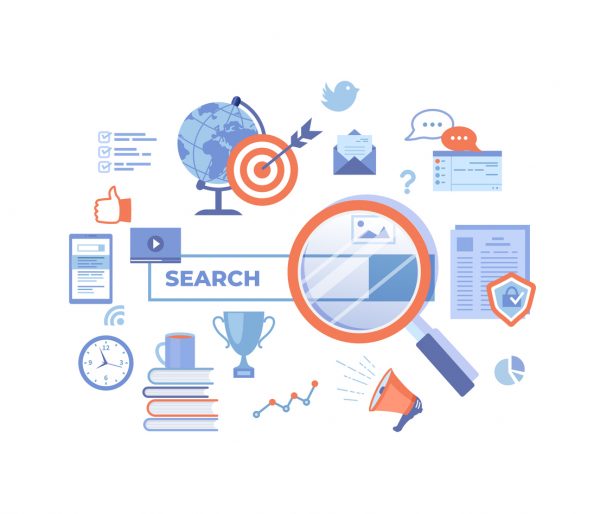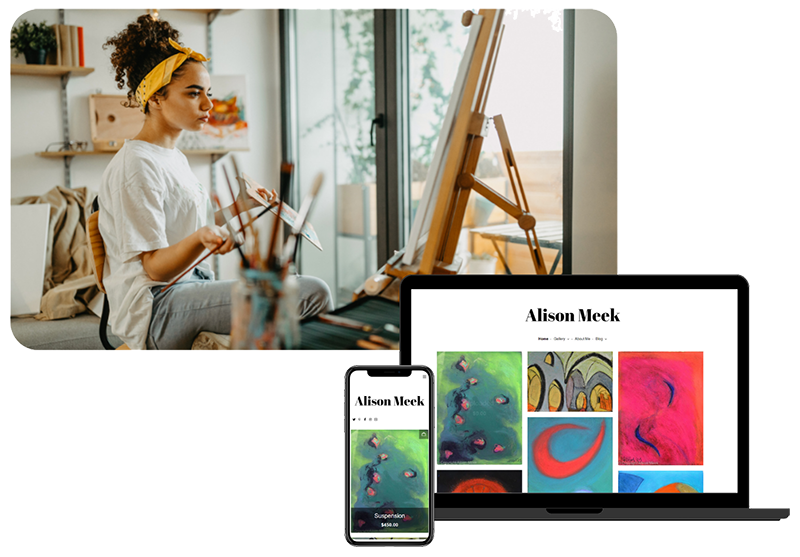This covers the basics of getting your artist website into search engines, like Google.
Introduction
Getting your site ranking well in search engines is a long-term task. It can take several months just to get listed, and then, depending on your resources, a lot longer to score well in popular categories. However, if your area is relatively niche, provided you don’t make any big mistakes, it’s quite possible that you will perform well soon after you are listed in search engines.
NB: If you’re not an ArtWeb member, then you may have some extra work to do, as ArtWeb sites already take care of some aspects of search engine submission and search engine optimization (SEO).

Basics of getting your artist site to rank
There are two aspects to consider when optimising your website for search engines: 1. what you do on your site and 2. what the rest of the internet is doing in relation to your site.
Your own site
Mainly, it is important that:
- your site is properly accessible to all visitors
- the page titles are relevant
- the site generally has good-quality content
- there are relevant outgoing links to other sites of internet (see the section below about search engine optimization)
If your site is not properly accessible to search engines, it simply won’t be listed at all.
The rest of the internet
Arguably of much greater importance is what the rest of the internet is doing in relation to your site! You can have the best website in the world, but if no other websites mention or link to your site, then you will be buried at the bottom of the search engine results. Consider the other websites that link to yours as an essential part of your reputation on the internet. Even if your site is excellent, if you don’t have a reputation (i.e. mentions or link backs), you won’t get many visits — just like if a very talented artist has no reputation, then it’s hard to find buyers!
Search engine optimization
This is a very large topic, but arguably the factors above are much more important, so this section is a brief summary. The external references at the end give a lot more info. Moreover, no doubt with research, you will find lots of techniques for SEO on the internet, however it is unwise to try and ‘cheat’. With time, search engines change their algorithms in order to produce results of the best quality and websites that use SEO to the detriment of their readers are often penalised by the search engines.
ArtWeb members
Again, for ArtWeb members, we have done a lot of the work for you. We ensure your sites are already search engine friendly. It’s really just down to you to decide on the content for your website.
Set up your website on HTTPS
Google loves security and has a policy of actively prioritising websites that use a secure connection to their users. On most web browsers you can see if your website has a secure connection by looking at the address bar — there should be a padlock icon up there next to the URL.
If you don’t already have your website working via a secure HTTPS connection, then that’s something you should do straight away. Most web hosts will have a facility for you to do this, and it may cost you an extra 10–30USD per year.
(ArtWeb users have this set up automatically on their site for free — no need to do anything!)
Check and fix page speed issues
Another thing Google loves is speed! You can check how fast your website loads using Google’s special tool—try it now.
A desktop and mobile score is 90 or higher is excellent. If it’s 75+, then it’s not too bad. Anything less and you probably have some work to do.
Under your score, you’ll see a detailed checklist of things to fix on your website to make it load faster. Unfortunately, most of this checklist is in webmaster speak, so you’ll probably need help from your web designer or web host. Fortunately for ArtWeb members, many of the important optimisations are done for you automatically.
Some items that you may be able to do that’ll help improve your score without any special webmaster skills:
- Replace any images on your website with a very large file size with images that are scaled down to the correct size for the page.
- Check for any unnecessary third party JavaScript, or plug-ins you may have installed on your website
Set up Google Search Console for your website
Google allows you to register your site and access information about how your website performs in Google searches, and which pages on your website are in the Google index.
You can register your site here:
https://search.google.com/search-console/about
NB: You’ll need to prove it is actually your website by uploading a page, or adding a meta tag to the <head> section of your website, etc.
Once you’ve registered, you can see what search terms bring people to your website, view potential problems that you should address, and much more. It also gives you a page speed report for all the pages on your site, similar to the point above.
Make sure your website is mobile friendly
Since more than half of all people accessing the web via a phone, it’s important to make sure that you have a proper website design that adapts for small screens. Moreover, if your website is not mobile friendly, it will be penalised in search results.
You can check your website now: https://search.google.com/test/mobile-friendly.
If it’s not passing the test, then you’ll need to make some changes to your website to fix that. Your current web host may allow you to easily select a “mobile friendly” or “responsive” design for your website. However depending on how your website is set up, it may be a lot more complex than that!
(Fortunately for ArtWeb members, you can change your website design to one of our popular mobile designs with just a few clicks.)
Page titles and meta information
For search engine rankings, the most important part of a web page is usually the page title. This is not visible in the main body of the page, but usually appears at the top of the web browser window. You should review your site and ensure that page titles reflects the content of the respective pages and also the type of keywords you wish to attract.
The meta keywords and meta description have apparently become of less importance. Again, these are elements not visible in the normal page body, but it’s worth putting together a list of 10 or so words and a couple of sentences of description for each page, if only because it helps you focus on what words you are optimising your page for.
Page content
With the list of words you have used as your meta keywords, it would be sensible to include these in the text content of the page. This should be done in a naturally grammatical way. Do not use keyword stuffing and repeat the words unnecessarily. Just ensure they appear on the page in a natural fashion.
Additional content
Similar to the suggestion of writing articles for other websites, it’s also beneficial to write informative articles on your own website, particularly on the topic you wish to attract visitors for. If you regularly add new content to your site, you will attract more traffic from search engines simply because there is more content which is relevant to people’s searches.
Outgoing links
No website is an island! It is also good to make sure your website is integrated with the rest of the internet. Your visitors will benefit is you have links on your site to other places of interest. A links page often serves this purpose, though it’s good to have links where appropriate on the rest of your website. For example, if you’re referring to a specific topic, link to the relevant Wikipedia page about it so readers can learn more.
Know your audience, known your keywords
Before writing the page titles and words for your website, it’s a good idea to have researched specifically the audience you wish to attract and what they are most likely to type when searching. For example, what specific type of English will they likely use (e.g. autumn vs fall), what’s the most common way of phrasing a search (“art events near me” vs “art events in London” vs “what art events are in Hackney this weekend”).
For more info on how to do this research have a look at this article:
Getting more incoming links
Incoming links can influence your rankings in search engines, particularly Google. Google will like your site more if it has good-quality incoming links, i.e. links from relevant sites and big, well-established sites. (This is also why having listings in the directory projects above is good.)
Add your website to all your social media profiles
If you haven’t already, make sure your website is on all your social media profiles, and any other community site you may belong to. See this post on social networking websites.
Sites you are already affiliated with
You probably already know a number of people and organisations with websites, such as:
- Local art groups
- Arts organisations
- Other artist friends
- Friends
If appropriate, ask them to link to your site.
Blogs, forums, Quora and wikis
Another effective method is to post to other websites and link to your site as part of the article you are writing. For example,
- Always include a link to your site in your email signature.
- Enter your website and artwork into art competitions.
- Sign up and answer questions on community sites like Quora
- Add informative articles to wikis. For instance you could write about your technique or do a brief tutorial and then link to your site as a reference. (Wikipedia: http://www.wikipedia.org)
Other tips and common pitfalls
How long does it take to get listed?
Generally search engines can take up to 6 months to initially include your website in their indexes. Even if they index your website straight away, if it’s a new website, then you may have to wait a year or two before search engines “trust” your website and your search results start to improve. You can speed this process up if you have incoming links from good-quality and legitimate websites.
If the domain name you are using is fairly old and has been in legitimate use for a number of years then you should already be trusted.
Domain name
Your domain name is also very important. You should choose a domain name that relates to your chosen topic/keywords, as the domain name is a strong indicator for the subject of the site.
For .com .net and .org domains, it is wise to register the domain for as many years as you can afford, rather than one year at a time.
Website design
There are many ways to design a website nowadays — free website creators and website builders abound! However, if you do use a generic/free website builder, you may end up paying more in the long run with poor search engine results and people being unable to find your site. It’s important to find a good service or web designer that is focused on creating a proper search engine friendly website without extra cruft.
Of course using ArtWeb, which is specifically designed for artists, could save you a lot of money and give you the peace of mind that it will be search engine friendly right out of the box.
Cheating
Don’t be tempted to use any of the ‘black hat’ SEO techniques that you may read about as you may get penalised and your website dropped from search engine results all together.. Above all, search engines are on your side, and if your website has good content and is search engine friendly, you will be listed appropriately.
External links
This post was originally published in 2011. Last updated in April 2021.






